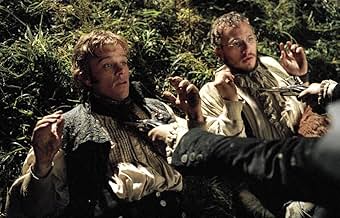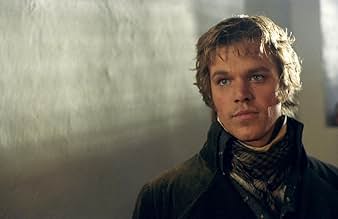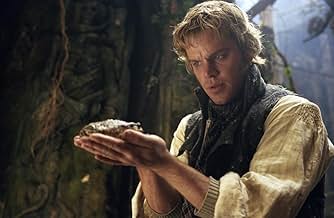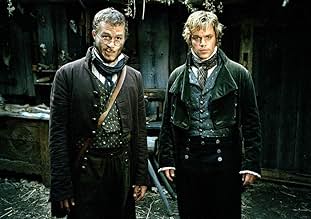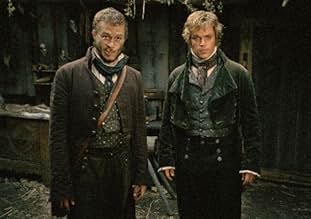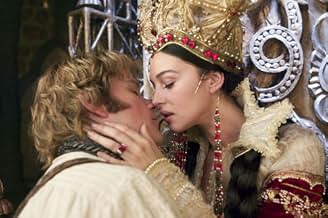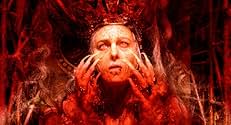Will y Jake Grimm son estafadores viajeros que se ven envueltos en una genuina maldición de cuento de hadas que requiere de verdadera valentía, no como en sus falsos exorcismos.Will y Jake Grimm son estafadores viajeros que se ven envueltos en una genuina maldición de cuento de hadas que requiere de verdadera valentía, no como en sus falsos exorcismos.Will y Jake Grimm son estafadores viajeros que se ven envueltos en una genuina maldición de cuento de hadas que requiere de verdadera valentía, no como en sus falsos exorcismos.
- Dirección
- Guionista
- Elenco
- Premios
- 4 premios ganados y 5 nominaciones en total
Barbora Lukesová
- Mother Grimm
- (as Barbara Lukesova)
Marika Sarah Procházková
- Miller's Daughter
- (as Marika Prochazkova)
Alena Jakobová
- Red Hooded Girl
- (as Alena Jakobova)
- Dirección
- Guionista
- Todo el elenco y el equipo
- Producción, taquilla y más en IMDbPro
Opiniones destacadas
Like his Baron Munchhausen, Gilliam's Brothers Grimm has been horridly misunderstood by critics and public alike. What I get from the comments and reviews is the sense of thwarted expectations, although I have little idea what the anti-Grimms expected in the first place. People dislike the kitten scene because it's a cute kitten. This I find entirely in the grotesque spirit of the original folk tales. We've learned to take our fairy tales Disneyfied, apparently. I've also heard complaints about the quality of the special effects as sub-ILM quality. Frankly, that's what I liked about them. They *didn't* look like ILM; they looked personal. I admit I found the basic premise a cliché (two con men who make their living on the superstitious gullible find out that, in this case, the magic is real), but its working-out overcomes this basic flaw. This is a movie that shuns cliché. The brightest scenes, for example, almost always contain the greatest menace. Relative safety is drab, dirty, brutish, nasty, and short. Ledger gives an amazing performance -- I had previously regarded him as a Troy Donahue update. Matt Damon shows he has the chops to cross over from small "indies" to big performances in the old leading-man vein. Peter Stromare and Jonathan Pryce do a highbrow Martin & Lewis -- Stromare all over the place and Pryce coolly self-contained -- to hilarious effect. The faces alone in this movie are wonderful, hearkening back to the glory days of Leone. There are so many telling details in the background ("Bienvenue a Karlstadt") -- let alone the foreground -- that show Gilliam's mastery. Harry Potter (which I enjoyed), Lord of the Rings, and Chronicles of Narnia are for the kiddies and show us worlds we can, with effort, control. Gilliam doesn't offer any such comfort, not even at the end. The sense of menace is overwhelming, and Gilliam achieves it without super-special effects, usually camera movement (the shots following Little Red Riding Hood through the forest made my jaw drop). A brilliant film, operating at a high level we don't see much of these days. Someone compared the movie to Burton's Big Fish, another film dismissed or ignored by critics and public. Although Burton's and Gilliam's sensibilities differ, I take the writer's point. The confident, poetic handling of myth and archetype in both astonishes.
Terry Gilliam's Brothers Grimm tells the story of the disappearances of several girls, and so enter the Brothers Grimm. Matt Damon and Heath Ledger are both excellent in the title roles, Ledger especially with a more sympathetic portrayal than expected. I liked Peter Stromare and Jonathan Pryce here too. The film is full of clever nods to their fairy tales. The production design is a wonder, with lavish sets and colourful costumes, and there is some evidence of some detailed direction, if a little too serious. However, I wasn't keen on Lena Headey's performance as the main female character, and the storyline is very daft, and sometimes in the middle half bordered on getting a bit too silly. The script was okay, but perhaps because of the story it was underdeveloped, and cheesy in some places, and it was further undermined by a rather anti-climatic conclusion, that left me a little confused. Still, not a bad film, not awful but not great either. It is well performed and well designed, but is let down by the story and script mainly. 6/10 Bethany Cox.
Squabbling brothers in France-occupied Germany circa 1811 have manufactured a heroic image for themselves as witch-hunters and tall-tale tellers, but when a decrepit witch in an enchanted forest begins stealing maidens for their youthful blood, the duo find themselves up against real evil for the first time. Terry Gilliam-directed fantasy has incredible production values, cinematography and scoring (not to mention two appealing lead performances by Matt Damon and Heath Ledger), yet it takes a good hour to get this picture off the ground. The narrative is heavy-going and, while not a hodgepodge, the film could certainly use a bit more heart rather than CGI effects. Gilliam's handling takes on a more robust, old-fashioned flavor in the second hour, and the movie improves tremendously as a result. The witch's palace (set atop a skyscraper tree) is dazzling, and the initial entrance into her raven-laden lair is deliciously giddy. Jonathan Pryce is well-cast as an evil general who attempts to torch the two men in an impressive forest fire, however the charm of the piece (and the glue holding the adventure together) lies with Damon and Ledger, and they are by turns wily, funny, strapping, childish, and heroic. **1/2 from ****
People have a curious tendency not to notice how bizarre and gruesome children's fairy tales often are. Terry Gilliam's "The Brothers Grimm" does notice. Unfortunately, that's just about its only insight into the subject. The film shows no understanding of what makes fairy tales memorable and exciting, or why they have endured through the ages.
A much better handling of the subject is the 1962 film "The Wonderful World of the Brothers Grimm," which intersperses a realistic though nonfactual account of the brothers' lives with dramatic recreations of the tales they collected. I'm not saying that Gilliam had to do a retread of the same material. I would be very happy to see a remake with a radically new approach, as long as it respects the underlying subject matter. Gilliam's film does not. Its storyline is mostly a long string of fantasy and horror clichés that remind us far more of contemporary movies than of classic fairy tales. The Big Bad Wolf, for example, has been reduced to a standard-issue wolf-man (brought to life with digital effects that are just a tad too jerky to be excused in our age of high-tech movie-making).
In this version, the brothers (Heath Ledger and Matt Damon, both inexplicably adopting English accents) are con artists who go from town to town posing as conjurers who can protect the local populace from evil spirits. A French general (Jonathan Pryce) catches on to what they're doing and forces them to work for him, on pain of death. But when they're sent to a new town, their old tricks prove useless against an age-old curse that really does haunt the woods.
The movie belongs to the old genre where famous writers become characters in their own stories. It's a genre I've never much liked, maybe because it suggests a failure to comprehend the powers of human imagination. ("No one could have made up these stories; they must have really happened!") But I have enjoyed a few films of this kind, such as the 1979 movie "Time After Time," where H.G. Wells builds a time machine and travels to the 1970s in pursuit of Jack the Ripper. This type of story has to work hard to achieve the willing suspension of disbelief. "The Brothers Grimm" fails on that front because it changes its reality too often. In an early scene, we're shown an intense battle with an awesome-looking banshee. Then the whole battle is revealed to have been staged. And then, later on, we're asked to believe that magic really does exist in this world after all. These repeated shifts in the story's reality are profoundly disorienting.
The source of disarray in the woods is an undead queen (Monica Bellucci) trying to regain her youth in an elaborate spell that will be completed once she sacrifices a series of children from the town. She resides in a tower in the woods, appearing as a skeleton on one side of a mirror and as a beautiful woman on the other. Her magical control over the woods serves as an excuse for numerous scenes of mysterious enchantment, most of which have a very tenuous connection to the central plot. The trees in the forest seem to have a life of their own, walking around when no one's looking. A mysterious creature lurks at the bottom of a well. The wolf-man is a servant of the mirror queen, using magic to ward off would-be visitors. But a coherent story never emerges from these elements. The screenplay seems to make up the rules as it goes along, inventing whatever is convenient at any given moment. Every now and then, some familiar quote is referenced--"Who is the fairest of them all?"; "What big eyes you have"; "You can't catch me, I'm the Gingerbread Man"--but always gratuitously. The movie's magical story is formless and convoluted, lacking any consistent narrative logic. It comes off as a series of elements arbitrarily glued together.
As a result, the magical sequences lack payoff. We keep waiting for something wondrous to happen, then nothing does. In one sequence, for example, two children named Hans and Greta are making their way through the woods, leaving a trail of bread crumbs in their wake. We eagerly await the children's encounter with the gingerbread house run by the cannibalistic witch, or at least something of comparable interest. But just about the only thing that happens is a mysterious sequence involving a levitating shawl. Like many other sequences in the film, this one doesn't go anywhere and has only the faintest connection with the mirror queen story.
No doubt there's an important theme at work in scenes like this. The movie is suggesting that the classic fairy tales are the result of accounts that have been embellished over time. But other writers have handled this theme much more effectively. Gregory Maguire's novel "Wicked," for example, turns "The Wizard of Oz" into a sophisticated adult fantasy with complex character motives and sly social satire. In that novel, there is a definite implication that we are being told the "real" story, and that the conventional version is the corruption. But the novel handles this conceit by expanding on the story, not degrading it. There's no point in creating a revisionist fairy tale if it's going to be less fleshed out than the original.
A much better handling of the subject is the 1962 film "The Wonderful World of the Brothers Grimm," which intersperses a realistic though nonfactual account of the brothers' lives with dramatic recreations of the tales they collected. I'm not saying that Gilliam had to do a retread of the same material. I would be very happy to see a remake with a radically new approach, as long as it respects the underlying subject matter. Gilliam's film does not. Its storyline is mostly a long string of fantasy and horror clichés that remind us far more of contemporary movies than of classic fairy tales. The Big Bad Wolf, for example, has been reduced to a standard-issue wolf-man (brought to life with digital effects that are just a tad too jerky to be excused in our age of high-tech movie-making).
In this version, the brothers (Heath Ledger and Matt Damon, both inexplicably adopting English accents) are con artists who go from town to town posing as conjurers who can protect the local populace from evil spirits. A French general (Jonathan Pryce) catches on to what they're doing and forces them to work for him, on pain of death. But when they're sent to a new town, their old tricks prove useless against an age-old curse that really does haunt the woods.
The movie belongs to the old genre where famous writers become characters in their own stories. It's a genre I've never much liked, maybe because it suggests a failure to comprehend the powers of human imagination. ("No one could have made up these stories; they must have really happened!") But I have enjoyed a few films of this kind, such as the 1979 movie "Time After Time," where H.G. Wells builds a time machine and travels to the 1970s in pursuit of Jack the Ripper. This type of story has to work hard to achieve the willing suspension of disbelief. "The Brothers Grimm" fails on that front because it changes its reality too often. In an early scene, we're shown an intense battle with an awesome-looking banshee. Then the whole battle is revealed to have been staged. And then, later on, we're asked to believe that magic really does exist in this world after all. These repeated shifts in the story's reality are profoundly disorienting.
The source of disarray in the woods is an undead queen (Monica Bellucci) trying to regain her youth in an elaborate spell that will be completed once she sacrifices a series of children from the town. She resides in a tower in the woods, appearing as a skeleton on one side of a mirror and as a beautiful woman on the other. Her magical control over the woods serves as an excuse for numerous scenes of mysterious enchantment, most of which have a very tenuous connection to the central plot. The trees in the forest seem to have a life of their own, walking around when no one's looking. A mysterious creature lurks at the bottom of a well. The wolf-man is a servant of the mirror queen, using magic to ward off would-be visitors. But a coherent story never emerges from these elements. The screenplay seems to make up the rules as it goes along, inventing whatever is convenient at any given moment. Every now and then, some familiar quote is referenced--"Who is the fairest of them all?"; "What big eyes you have"; "You can't catch me, I'm the Gingerbread Man"--but always gratuitously. The movie's magical story is formless and convoluted, lacking any consistent narrative logic. It comes off as a series of elements arbitrarily glued together.
As a result, the magical sequences lack payoff. We keep waiting for something wondrous to happen, then nothing does. In one sequence, for example, two children named Hans and Greta are making their way through the woods, leaving a trail of bread crumbs in their wake. We eagerly await the children's encounter with the gingerbread house run by the cannibalistic witch, or at least something of comparable interest. But just about the only thing that happens is a mysterious sequence involving a levitating shawl. Like many other sequences in the film, this one doesn't go anywhere and has only the faintest connection with the mirror queen story.
No doubt there's an important theme at work in scenes like this. The movie is suggesting that the classic fairy tales are the result of accounts that have been embellished over time. But other writers have handled this theme much more effectively. Gregory Maguire's novel "Wicked," for example, turns "The Wizard of Oz" into a sophisticated adult fantasy with complex character motives and sly social satire. In that novel, there is a definite implication that we are being told the "real" story, and that the conventional version is the corruption. But the novel handles this conceit by expanding on the story, not degrading it. There's no point in creating a revisionist fairy tale if it's going to be less fleshed out than the original.
There have been some great films that were essentially written during filming. Wim Wenders' "Wings of Desire" comes to mind, a visual & philosophical feast that was born out of 10 short poems. And of course the greatest comedy ever made, "This Is Spinal Tap" was basically improvised from start to finish. Here we have the opposite: a film which was probably carefully planned, but it feels like they're making it up because, oh LORDY, some of the plot points are barely recognizable as sensible.
The story jumps around, presumably referencing different Grimm's fairytales (wink, nod, move on) culminating in the worst story resolution I've ever seen since the Magical Mr. Mestopholes hopped on a giant tire and floated up to heaven. You've heard of the phrase "Deus ex machina"? Well, the Brothers Grimm takes that concept to the brink of Dumbass ex machina.
But that's not my biggest gripe. My biggest gripe is that the great Terry Gilliam ("Brazil", "The Fisher King", "12 Monkeys", "Monty Python and the Holy Grail", "Fear and Loathing in Las Vegas") directs this movie obviously trying his best to be Tim Burton and forcing Matt Damon to do his best Johnny Depp, but really he should've stuck with what he's good at: being Terry Gilliam.
I'll explain. Terry Gilliam's (good) movies are subtle; they breathe; they are drenched in sarcasm so deep that punchlines are not necessary. His violence is disturbing in a meaningful way, much like Tarantino does in films like "Pulp Fiction", making us laugh at the horror not the slapstick. Here we get slapstick, but with gross stuff. Big difference. If this is indeed a "fairytale for adults", then the adults for whom it's intended are probably in need of a good fart joke to cap the night.
Everyone is trying too hard to be funny (with the exception of Heath Ledger who does a great job as the sole "straight man" in this barrage of silly). And Matt Damon, don't get me wrong, is a great actor and very funny, but not in the straight faced Johnny Depp way that Gilliam was obviously coaching him to do.
The result is a weird mix of "The Three Stooges" and some hyper violent videogame, all played by a cast of great actors who should've really been allowed to be themselves rather than playing clowns. Add to the mix the aforementioned scotch taped plot, and you have yourself a bona fide waste of incredible talent.
Watch Tim Burton/Johnny Depp in "Sleepy Hollow" instead. I guarantee you that's what Gilliam was trying hard to recreate, but there's only so much you can do with a choppy, silly plot line like we have here. To any Terry Gilliam fans reading this, you might want to run away from this film. Let's just sorta sweep it under the rug like it never happened, sort of like the Star Wars Christmas Special.
The story jumps around, presumably referencing different Grimm's fairytales (wink, nod, move on) culminating in the worst story resolution I've ever seen since the Magical Mr. Mestopholes hopped on a giant tire and floated up to heaven. You've heard of the phrase "Deus ex machina"? Well, the Brothers Grimm takes that concept to the brink of Dumbass ex machina.
But that's not my biggest gripe. My biggest gripe is that the great Terry Gilliam ("Brazil", "The Fisher King", "12 Monkeys", "Monty Python and the Holy Grail", "Fear and Loathing in Las Vegas") directs this movie obviously trying his best to be Tim Burton and forcing Matt Damon to do his best Johnny Depp, but really he should've stuck with what he's good at: being Terry Gilliam.
I'll explain. Terry Gilliam's (good) movies are subtle; they breathe; they are drenched in sarcasm so deep that punchlines are not necessary. His violence is disturbing in a meaningful way, much like Tarantino does in films like "Pulp Fiction", making us laugh at the horror not the slapstick. Here we get slapstick, but with gross stuff. Big difference. If this is indeed a "fairytale for adults", then the adults for whom it's intended are probably in need of a good fart joke to cap the night.
Everyone is trying too hard to be funny (with the exception of Heath Ledger who does a great job as the sole "straight man" in this barrage of silly). And Matt Damon, don't get me wrong, is a great actor and very funny, but not in the straight faced Johnny Depp way that Gilliam was obviously coaching him to do.
The result is a weird mix of "The Three Stooges" and some hyper violent videogame, all played by a cast of great actors who should've really been allowed to be themselves rather than playing clowns. Add to the mix the aforementioned scotch taped plot, and you have yourself a bona fide waste of incredible talent.
Watch Tim Burton/Johnny Depp in "Sleepy Hollow" instead. I guarantee you that's what Gilliam was trying hard to recreate, but there's only so much you can do with a choppy, silly plot line like we have here. To any Terry Gilliam fans reading this, you might want to run away from this film. Let's just sorta sweep it under the rug like it never happened, sort of like the Star Wars Christmas Special.
¿Sabías que…?
- TriviaMatt Damon and Heath Ledger were originally cast in opposite roles. They petitioned and switched their roles.
- ErroresDifferent characters are heard humming the famous lullaby by Johannes Brahms, who published it in 1868, many years after 1811 when action is supposed to be happening.
- Citas
Jacob Grimm: It's this way, Will!
Will Grimm: No, no, it's not, it's not. It's that way! Grandmother Toad told me!
Jacob Grimm: What?
Will Grimm: [dead serious] Trust the toad!
- Créditos curiososAfter the credits, a howling wolf can be heard over the Dimension Films tiger logo stylized to look a bit like the MGM roaring lion.
- ConexionesFeatured in Today: Episode dated 8 August 2005 (2005)
- Bandas sonorasHappy Ending
Composed and Performed by Ladislav Horak, Frantisek Matijovsky, Ivo Mrazek,
Josef Vondracek and Lubos Harazin
Selecciones populares
Inicia sesión para calificar y agrega a la lista de videos para obtener recomendaciones personalizadas
- How long is The Brothers Grimm?Con tecnología de Alexa
Detalles
- Fecha de lanzamiento
- Países de origen
- Sitios oficiales
- Idiomas
- También se conoce como
- The Brothers Grimm
- Locaciones de filmación
- Productoras
- Ver más créditos de la compañía en IMDbPro
Taquilla
- Presupuesto
- USD 88,000,000 (estimado)
- Total en EE. UU. y Canadá
- USD 37,916,267
- Fin de semana de estreno en EE. UU. y Canadá
- USD 15,093,000
- 28 ago 2005
- Total a nivel mundial
- USD 105,316,267
- Tiempo de ejecución1 hora 58 minutos
- Color
- Mezcla de sonido
- Relación de aspecto
- 1.85 : 1
Contribuir a esta página
Sugiere una edición o agrega el contenido que falta

Principales brechas de datos
What is the Japanese language plot outline for Los hermanos Grimm (2005)?
Responda

